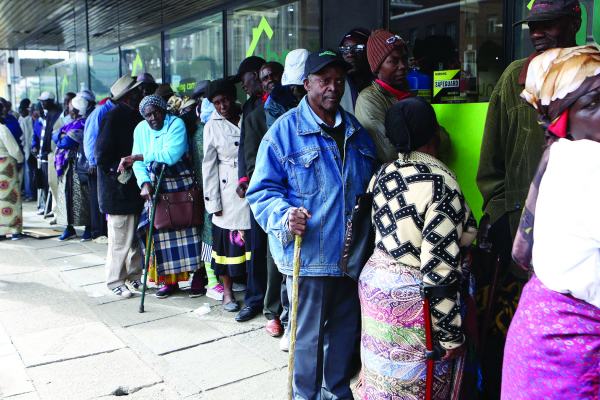
DORCAS Mudzimba (74) is a retired teacher. With the aid of a walking stick, she carefully minds her steps as she goes down Pine Street in Marondera.
BY JAIROS SAUNYAMA
From the crowd emerges a neatly dressed young woman with a bunch of fliers in her hand.
The young woman blocks Mudzimba’s way before handing one of the fliers to the senior citizen, who could not help but try to understand the intentions of the stranger.
“Gogo, I can see that you are struggling to walk, but I have solutions to all these problems. We sell traditional herbs behind that building. If you try them, your problems are over. The herbs do cure cancer and all the ailments,” the youthful woman said.
Mudzimba is one of the elderly people who have become soft targets for herbalists. In Marondera, getting old has become a curse, as young people harass the ageing and frail-looking, as they market their herbs.
“Walking along the streets is now difficulty. There is no peace, children of today always nag us. I am not here for the herbalist, I have other things to do,” she said.
To Mudzimba, it was, indeed, a bad welcome in the heart of the town. But more was waiting for her.
- Chamisa under fire over US$120K donation
- Mavhunga puts DeMbare into Chibuku quarterfinals
- Pension funds bet on Cabora Bassa oilfields
- Councils defy govt fire tender directive
Keep Reading
As she entered a local bank, she enjoyed the privilege of being the senior citizen and headed straight to the counter oblivious of the long queue.
Mudzimba shook her head as the teller told her to wait for some depositors so that she might be given $20 of her paltry pension money per month.
The current economic meltdown had taken a toll on the elderly who are failing to access their moneys saved during working years.
Early this year, scores of disgruntled pensioners stormed Mhlahlandlela government offices in Bulawayo demanding that they be paid $150 pension money. The pensioners revealed that they were getting a paltry $17 per month.
Insurance and Pensions Commission spokesperson Lloyd Gumbo confirmed the plight of senior citizens who are getting peanuts and said this was caused by the conversion methods employed by pension companies at the start of the multi-currency regime.
“It should be noted that some of the low values being received by pensioners are a result of the conversion from the Zimbabwe dollar to the multi-currency regime introduced in February 2009,” he said.
“The issue of low pension values was looked into by the government to see if there were any gaps in the conversion methods that were used by different companies and to ascertain if there was really any loss suffered by the members.”
In 2015, pension funds and insurance companies converted pension funds from Zimbabwe dollars to United States dollars, leaving most pensioners with nothing.
Gumbo added that it was now up to government to implement the recommendations by the commission inquiry.
“The government-instituted Commission of Inquiry Report was gazetted in February 2018 and has made recommendations to the effect that fund members should be compensated for loss of value due to the conversion referred to above. The government will advise on the way forward in terms of the modalities of the compensation,” he said.
Mudzimba is a victim of the harsh economy. As she goes back home, she hopes that one day, things will get better so that she can enjoy her benefits until she joins her ancestors.
But today, her journey to the bank denotes her plight and that of her fellow elderly people who are failing to withdraw the little they saved in their heydays.
The wrinkles on her face are of benefit to the youths on the streets, who are assured that she might need their uncertified herbs, as they harass the elderly to earn a living in an economy where unemployment rates above 90%.











